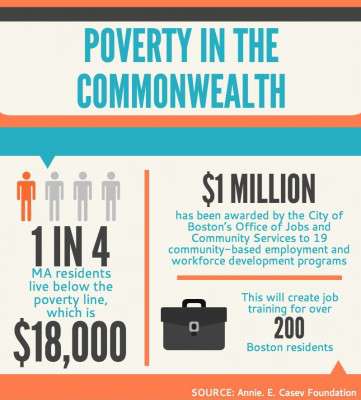
One out of every four Massachusetts resident is living at or near the poverty level, according to a Monday report.
The report, released by the Massachusetts Budget and Policy Center, entitled “From Poverty to Opportunity: The Challenge of Building a Great Society,” determined that the poverty rate in Massachusetts has remained stagnant since the 1960s. The study, written by Nancy Wegman, and funded by the Annie E. Casey Foundation, stated that only the top 1 percent of earners experienced economic growth over the years.
With productivity growing since the 1960s, wages have remained stagnant for low and middle-income families, according to the report. While Massachusetts is one of the wealthiest states in the country, there has been no significant progress in eliminating poverty. About 1 in 4 people in Massachusetts make incomes under 200 percent of the $18,800 poverty rate.
The Massachusetts Association for Community Action, an organization focused on ending poverty with the help of 24 non-profit advocacy groups, commissioned the report. Executive Director Joe Diamond said the study was necessary on the 50th anniversary of the passage of the Economic Opportunity Act of 1964, which marked the start of the War on Poverty.
“Inequality is a challenge that we’re facing across the country, and there is a renewed interest in addressing it,” Diamond said. “The gap between the rich and the poor continues to widen. We thought it was very important to take stock of what is happening in the state of Massachusetts.”
One of MASSCAP’s main goals is to make the economy work for everyone, he said. The organization plans to create a task force on poverty in Massachusetts to raise awareness, perform research and develop recommendations to reduce the rates of poverty in the Commonwealth.
“It’s important to note that this is an effort that we believe will be successful, but only if people work together,” Diamond said. “A broad group of interested parties who can recognize that there is increased interest in addressing inequality. We have an opportunity now to really make a dent.”
More than half of those living in poverty in Massachusetts are high school graduates with jobs, according to the study. However, Diamond pointed out that welfare programs such as Medicare, food stamp, the Supplemental Nutrition Assistance Program, Social Security and Head Start, an organization that provides early childhood education, keep over 800,000 Massachusetts residents out of poverty.
Paul Bailey, president of the board of directors of MASSCAP, said the agency offers safety net programs to support those living in poverty, with the hope of easing their burden.
“We are seeking for Massachusetts an economy that provides opportunity for all,” he said in a Monday press release. “Lifting the income of low and moderate wage workers is one way to achieve that vision and to help prevent poverty.”
As for action taken by the city, Gabrielle Farrell, a spokeswoman for Boston Mayor Martin Walsh, said the mayor is planning to reduce these high poverty rates by implementing new programs that will greatly benefit the city.
“Mayor Walsh has aimed to address many of the contributing factors leading up to poverty by instituting a number of programs and initiatives,” she said in an email. “Recently, he opened an Office of Financial Empowerment in Dudley Square, Roxbury and has been constantly working to address and improve matters of chronic homelessness and recovery services.”
Farrell also mentioned grants that will help the unemployed find jobs in Boston.
“The City of Boston’s Office of Jobs and Community Services, an affiliate of the Boston Redevelopment Authority, also recently awarded just over $1 million to 19 community-based employment and workforce development programs,” she said. “More than 200 Boston residents will receive job training under these grants.”
Several Boston residents said they were not shocked by the findings of the report and offered some possible solutions to the issue.
John McGann, 30, of Brighton, said the issue of poverty begins with the homeless, who lack the most in opportunities.
“I just moved from Allston, and that’s where I see most of the poverty,” he said. “I see a lot of homeless people in all sorts of weather conditions. They definitely feel like they don’t have opportunities.”
Lena Khan, 18, of Allston, said politicians could take action to reduce the poverty rates, directly helping those at the low-income level.
“Politicians could increase the employment rate and minimum wages, because people are living in these conditions due to their low incomes,” she said. “They need to support their families and they can’t do that while paying rent and other bills.”
Angie Boehler, 49, of Brighton, said she predicts the rich are going to get richer, especially with the results from recent elections.
“With the elections voting in mostly Republicans all over the country, I think they’re more able to help the 1 percent over the middle class,” she said. “To help the economy, you need to bolster the middle class and that’s not going to happen. There’s going to be lots of jobs out there, but they’re all going to be minimum wage and part-time, which does not help the economy or the poverty rates.”




















































































































